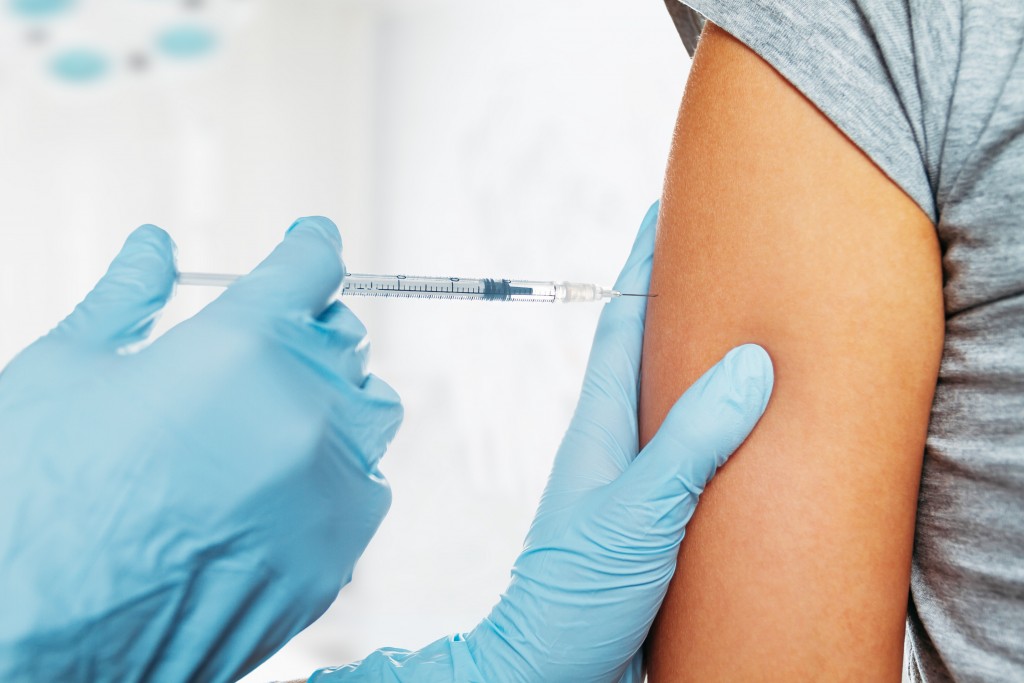 What is meningitis?
What is meningitis?
According to the Centers for Disease Control and Prevention (CDC), meningitis is an inflammation or swelling of the protective membranes covering the brain and spinal cord. Although meningitis can have several causes, the most common types are caused by bacteria and viruses. Outbreaks of some types of meningococcal disease have been reported on college campuses in recent years. Many states now require that incoming college students be vaccinated against meningococcal disease, particularly those who will be living in campus housing. The CDC highly recommends the vaccinations. It is considered preventative health.
Viral Meningitis
The most common type of meningitis is caused by viruses. While these infections are serious, they are usually less severe than bacterial meningitis. Early symptoms may seem like flu. There may be a high fever, stiff neck, severe headache, vomiting, seizures, confusion, sleepiness or difficulty waking from sleep.
Bacterial Meningitis
Symptoms are generally the same as the viral type. However, the onset of symptoms is very rapid. Bacterial meningitis can be life threatening. Swelling of the tissues around the brain can lead to paralysis, stroke, and death.
Meningitis diagnosis and treatment
Testing for meningitis is done through blood samples, nasal or throat swabs, and the drawing of spinal fluid for examination. There is no specific treatment for viral meningitis. Antibiotics are not used. Some antiviral medications may be effective. Most patients with mild cases will be able to recover on their own.
Patients with bacterial meningitis must receive immediate treatment with intravenous antibiotics. Sometimes corticosteroids are given to reduce brain swelling. If not treated quickly enough, a patient may develop sepsis and can die. Bacterial meningitis can cause permanent disabilities including hearing loss and brain damage.
Meningitis Vaccines for meningococcal disease
The CDC recommends that preteens ages 11-12 years old receive the MenACWY vaccine. This vaccine protects against four different strains of meningococcal bacteria. A booster dose should be given at age 16. Teens and young adults ages 16-23 may also get a MenB vaccine. The preferred age is 16-18 years, and multiple doses give the best protection. This vaccine protects against a less common strain of meningococcal disease. If your teenager has not received these vaccines, talk to your healthcare provider at RMD Primary Care about getting vaccinated.
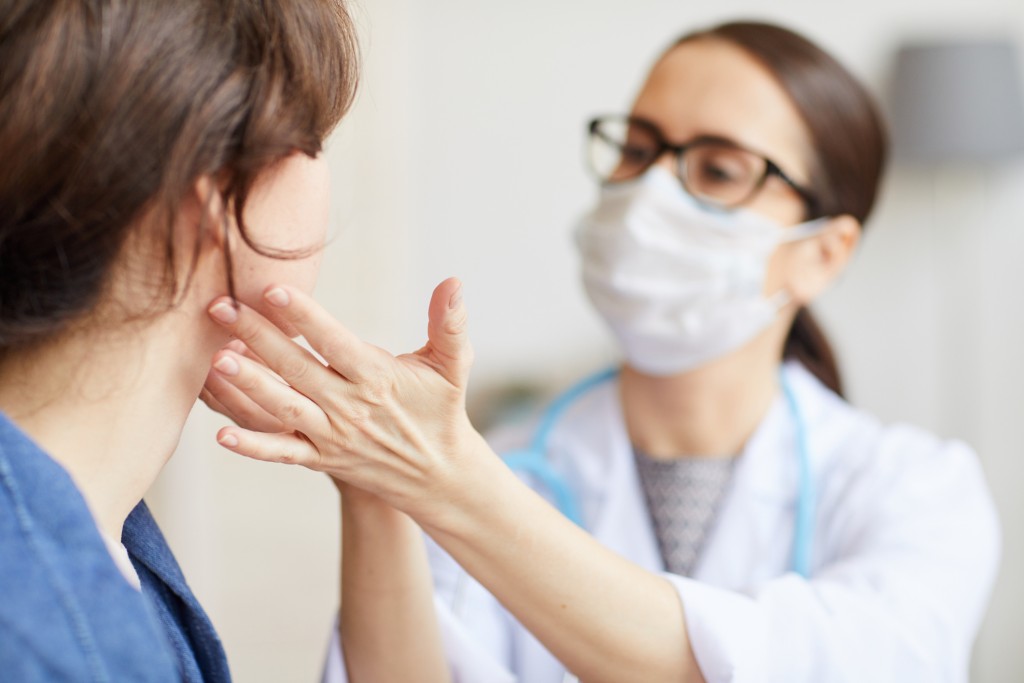 A regular physical exam is an integral part of maintaining your overall physical health. It helps your primary care physician (PCP) determine your general health status. This is a prime opportunity for patients to talk to their doctor about any health concerns they may have. It is recommended that patients see their health care provider at least once a year for a physical exam or wellness check. This is a more comprehensive visit than going just when feeling ill. Some people have recently postponed these physical exams due to concerns about COVID-19. However, these exams are too important to put off, and the doctor’s office will ensure that patients can safely visit.
A regular physical exam is an integral part of maintaining your overall physical health. It helps your primary care physician (PCP) determine your general health status. This is a prime opportunity for patients to talk to their doctor about any health concerns they may have. It is recommended that patients see their health care provider at least once a year for a physical exam or wellness check. This is a more comprehensive visit than going just when feeling ill. Some people have recently postponed these physical exams due to concerns about COVID-19. However, these exams are too important to put off, and the doctor’s office will ensure that patients can safely visit.
Your healthcare provider may want to perform specific tests during the visit. These may include listening to your heart to look for any abnormal heart rhythms or other irregularities. They may listen to your breathing to make sure there are no problems with the lungs. The doctor will also listen for sounds in the abdomen to check for issues with the bowel and intestines. Weight, pulse, and blood pressure will be checked. A urinalysis may be ordered.
Routine blood work may be performed to check cholesterol, triglycerides, blood sugar, hemoglobin, and other levels. Periodic blood work may be required if the patient is taking some prescription medications. A basic metabolic panel helps the doctor determine whether certain organs in the body are functioning correctly. Abnormal levels in the blood work may be an indication of diabetes, liver problems, kidney disease, or cancer. Medications may be prescribed or modified, depending on the results of the blood work.
An annual physical is the time for the doctor to make sure vaccinations are up to date. Vaccinations are important for protecting children from disease, but adults may also need a booster shot. The CDC recommends that older adults receive vaccinations for flu, shingles, pneumonia, and pertussis (whooping cough).
A physical exam appointment helps patients determine whether they have been effectively managing any chronic health conditions. This is the perfect time to ask questions and raise any concerns regarding their health or medications. The doctor can advise on any lifestyle changes that need to be made in the areas of diet, exercise, alcohol use, and smoking.
Don’t put off that regular physical exam. Make an appointment today at RMD Primary Care. Call 678-430-3627 to schedule an appointment or for questions.
The Centers for Disease Control and Prevention (CDC) recommends the following steps to help protect other people in your home and community if you think you might have COVID-19.
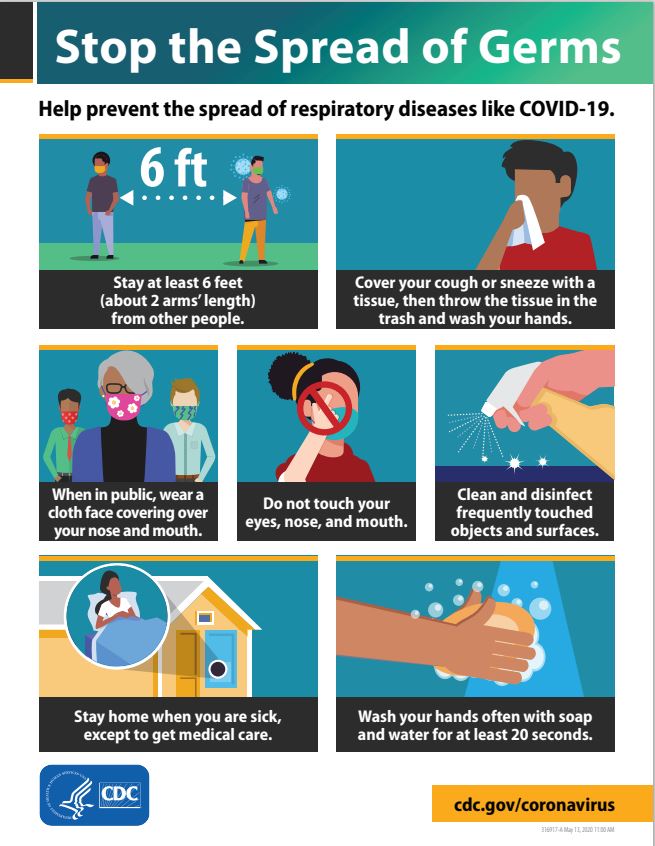
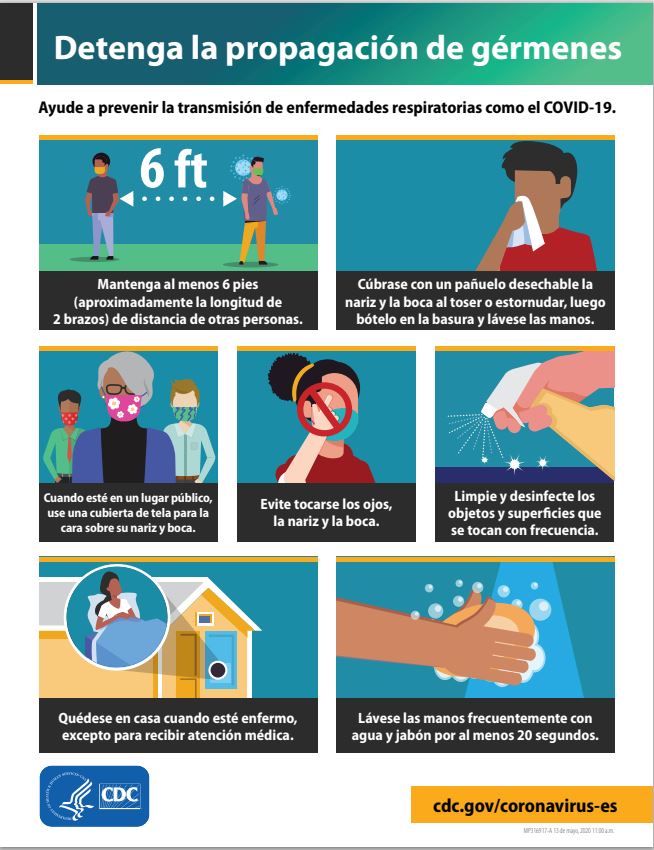
Stay Home except to get medical care.
- Stay Home. Most people with COVID-19 have mild illness and are able to recover at home without medical care. The CDC recommends that you do not leave your home, except to get medical care. Do not visit public areas.
Call your Doctor before you go to their office for care.
All patients are advised if they start to feel symptoms Do Not show up to your appointment. Please call us first for further instructions.
If you have trouble breathing or other concerning symptoms, call 911 for immediate help.
Take Care of yourself.
- Get rest and stay hydrated.
Avoid public transportation.
- Please do not use ride-sharing (such as Uber or Lyft), taxis, Gwinnett Transit, buses, or MARTA if you might have COVID-19.
Separate yourself from other people and pets in your home.
As much as possible, stay in a separate room.
- Stay away from other people and pets in your home. Also, you should use a separate bathroom, if available. If you must be around other people or animals in our outside of the home, wear a cloth face covering.
- To learn more about COVID-19 and Animals from the CDC, click here.
Monitoring your symptoms.
Common symptoms of COVID-19 include fever and cough.
- Trouble breathing is a more serious symptom that means you should get medical attention.
The CDC advises:
- Stay home when you are sick and limit contact with others
- Wash your hands frequently with soap and water for 20 seconds or use hand sanitizing gel
- Cover your cough with your elbow and sneeze into a tissue
- Clean and disinfect frequently touched objects in your home (cellphones, for example)
- Do not travel while sick
Emergency Warning signs.
If you development emergency warning signs for COVID-19 get medical attention immediately.
Emergency warning signs include:
- Trouble breathing
- Persistent pain or pressure in the chest
- New confusion or not able to be woken
- Bluish lips or face
This list is not all inclusive.
Call 911 if you have a medical emergency.
Call head before visiting your doctor.
At RMD Primary Care, we advise all patients if they start to feel symptoms to call us first for further instructions. No not show up to appointment.
If you are sick, wear a cloth covering over your nose and mouth.
- Wear a face covering over your nose and mouth if you mist be around other people or animals (even at home)
- You don’t need to wear the cloth covering If you are alone.
- If you are not able to wear a face covering (due to trouble breathing), cover your coughs and sneezes in some other way.
Try to stay at least 6 feet away from other people. This will help protect the people around you.
Cloth face coverings can be made using a scarf or bandana. Please note, during the pandemic, medical grade facemasks (such as N95 masks) are reserved for healthcare workers and some first responders.
Source: cdc.gov/coronavirus
How RMD Primary Care is protecting you while visiting our office:
During the pandemic, we are only seeing patients with scheduled appointments. Please call to make an appointment.
Welcome Station at entrance to office includes:
- Temperature screenings
- System screenings
- Masks, available if needed
- Companion / caregiver limitations
Waiting area now includes:
- Social distance seating
- Removal of all common objects such as reading materials and toys
- Hand sanitizer
Exam Rooms now include:
- Designated room for evaluation of COVID suspects
- Designated clinical team
- PPE stored outside the exam rooms
- Soap and tissue
- No touch trash bins
We’ve also implemented upgraded general cleaning and infection control procedures, including:
- Wiping all surfaces, handles, and equipment after each patient
- Enhanced protocol after COVID suspect patient
- For common areas we’re wiping down all surfaces and supplies at regular intervals, maintained in a cleaning log
At RMD Primary Care we are focused on Protecting Patients and making the office a Safe Environment.
To learn more about protecting yourself, visit the CDC’s website. Also, visit our blog to learn more about Protecting Yourself from Coronavirus.
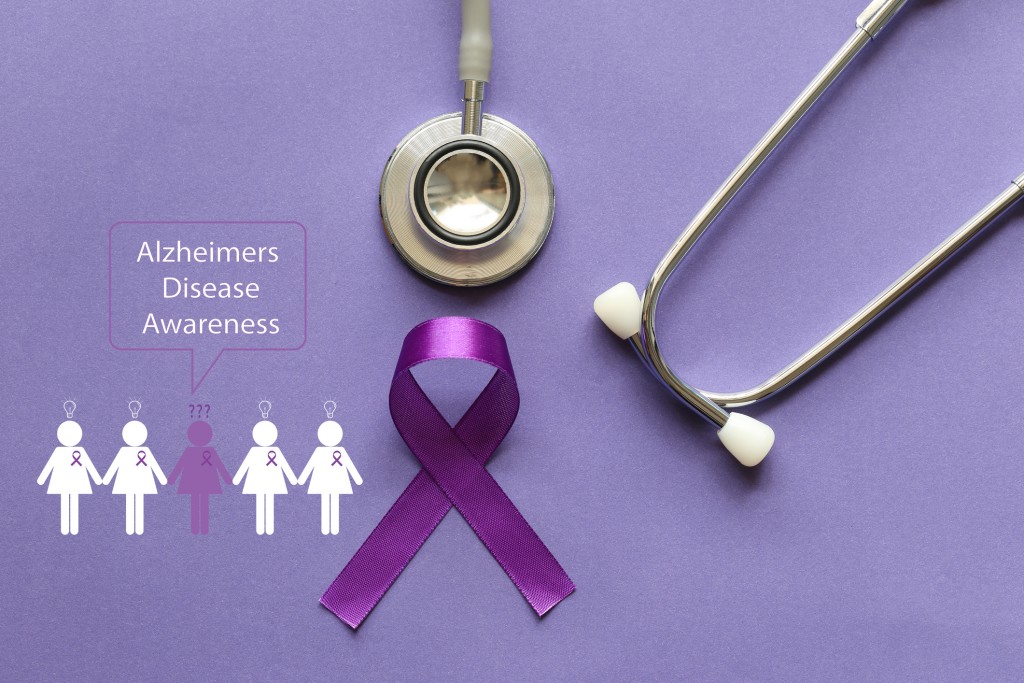 June is Alzheimer’s and Brain Awareness Month. Most of us know someone with Alzheimer’s disease, the most common type of dementia. Symptoms of the disease usually begin with memory loss, but eventually involve the parts of the brain that control thought, memory, language, and reasoning skills. Alzheimer’s impacts a person’s ability to carry out daily tasks and activities, including the ability to communicate.
June is Alzheimer’s and Brain Awareness Month. Most of us know someone with Alzheimer’s disease, the most common type of dementia. Symptoms of the disease usually begin with memory loss, but eventually involve the parts of the brain that control thought, memory, language, and reasoning skills. Alzheimer’s impacts a person’s ability to carry out daily tasks and activities, including the ability to communicate.
The main risk factor for Alzheimer’s is age. Symptoms may begin to appear around age 60. Women are twice as likely as men to develop Alzheimer’s, primarily because they live longer. A family history of the disease may also increase the risk. Researchers are studying other possible risk factors such as having high cholesterol and high blood pressure.
The Alzheimer’s Association lists 10 early signs and symptoms of Alzheimer’s disease.
- Memory loss that disrupts daily life – This may include forgetting recently learned information such as dates, appointments, or events.
- Difficulty in planning or solving problems – There may be challenges managing finances, paying monthly bills, or following a recipe.
- Trouble completing familiar tasks – Examples may include getting lost driving to familiar places or having difficulty running familiar errands.
- Confusion with time and place – The person may lose track of dates or the passage of time.
- Difficulty understanding visual images and special relationships – This may lead to difficulty reading or judging distances.
- New problems with words in speaking or writing – The person may struggle to find words or follow conversations.
- Misplacing things – They may be unable to retrace steps to find things. Others may be accused of taking items.
- Decreased or poor judgment – There may be difficulty making decisions or making poor decisions.
- Withdrawal from work or social activities – There may be a loss of interest in hobbies or activities previously enjoyed.
- Changes in mood, personality, or behavior – Examples may include confusion, fear, suspicion, or depression.
Understanding Alzheimer’s Awareness
There is no cure for Alzheimer’s. Treatment includes managing and slowing down symptoms and helping those affected maintain their mental function. If you notice some of these changes occurring in a loved one, make an appointment to discuss them with their doctor or contact RMD Primary Care. Alzheimer’s awareness is key for treating symptoms.
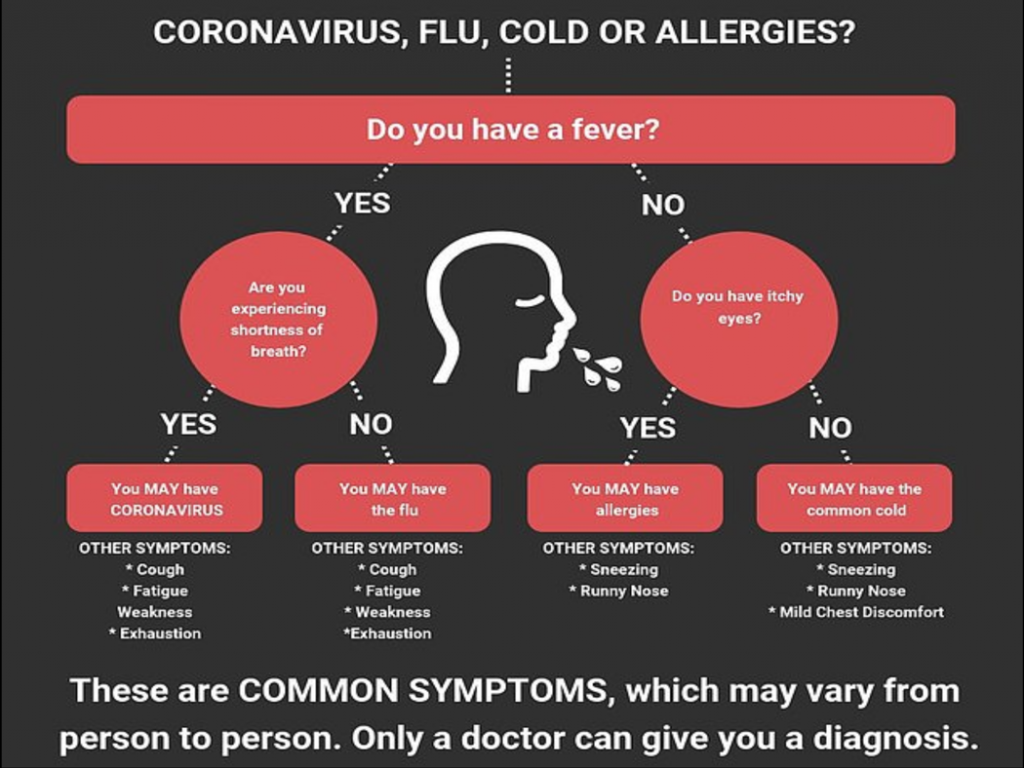
At RMD Primary Care, the health and well being of our patients and staff is of utmost importance to us. We especially want our patients to be aware of the best practices to safeguard their health and their families against the spread of Coronavirus (COVID-19). This includes measures to protect themselves from contracting the virus as well as what to do if you are experiencing any of its symptoms.
We strongly recommend following the guidelines outlined by the Centers for Disease Control and Prevention (CDC). Since there is not yet a vaccine for the Coronavirus, it is important to be proactive in protecting ourselves. These measures will help prevent the spread of Coronavirus and other respiratory illnesses, including influenza, in our community. The following information comes directly from the CDC’s website, www.cdc.gov.
How to protect yourself
- Wash your hands often with soap and water for 20 seconds, especially after having been in a public place and after sneezing, coughing, or blowing your nose. Do not touch your face, eyes, nose, and mouth with unwashed hands. If soap and water are not available, clean your hands with a hand sanitizer that contains at least 60% alcohol.
- Avoid close contact with people who are sick. This is especially important for older adults and people with serious chronic medical conditions like heart disease, diabetes, and lung disease. Avoid crowds as much as possible and stay home to reduce the risk of being exposed.
- Avoid all non-essential travel.
Supplies to have on hand
- Any prescription medications that you may need.
- Over-the-counter medications and supplies (tissues) to treat fever and other symptoms
- Have enough groceries and household items so that you can isolate at home if infected. Stock up on non-perishable foods and limit trips to the store.
Watch for symptoms
These symptoms may appear 2-14 days after exposure to Coronavirus.
- Fever
- Coughing
- Shortness of breath
Emergency warning signs for COVID-19 include:
- Difficulty breathing or shortness of breath
- Persistent pain or pressure in the chest
- New confusion or inability to arouse
- Bluish lips or face
What to do if you are sick
- Call your doctor for advice if you develop symptoms of COVID-19. Do not go to the doctor’s office without calling first.
- Isolate at home to keep from spreading the virus to others. Separate yourself from other people and pets in the household.
- Use a separate bedroom and bathroom if possible.
- Cover your mouth and nose with a tissue when coughing or sneezing. Dispose of tissues in a lined trash can. Wash hands immediately with soap and water for 20 seconds.
- Avoid sharing personal household items.
- Clean and disinfect all high-touch surfaces every day. This includes counters, tables, doorknobs, bathroom fixtures, toilets, phones, keyboards, tablets, and bedside tables.
- Wash laundry and bedding thoroughly.
Persons with confirmed COVID-19 should continue to isolate at home until instructed by their healthcare professional to discontinue.
 Cholesterol levels are measured by a blood test referred to as a lipid profile or lipid panel. The numbers are broken down into LDL (low density lipoprotein), which is “bad” cholesterol and HDL (high density lipoprotein), known as the “good” cholesterol. Most of the body’s cholesterol falls into the LDL category.
Cholesterol levels are measured by a blood test referred to as a lipid profile or lipid panel. The numbers are broken down into LDL (low density lipoprotein), which is “bad” cholesterol and HDL (high density lipoprotein), known as the “good” cholesterol. Most of the body’s cholesterol falls into the LDL category.
An overabundance of LDL cholesterol forms a build up of plaque along the walls of the blood vessels. This plaque, if thick enough, can block blood flow causing a heart attack. The lower the LDL number, the lower the risk of developing heart disease.
The high density lipoproteins absorb cholesterol and take it to the liver. It can then be flushed from the body before it can block the blood vessels. A higher HDL number on the lipid profile indicates a lower risk for heart disease.
An LDL number of 190 mg/dL or higher means a higher risk for heart disease. An HDL number less than 40 mg/dL for men and less than 50 mg/dL for women indicates higher risk. The lipid profile also measures triglycerides and gives the total cholesterol number. The doctor takes all these numbers into consideration when recommending treatment options. Diet and lifestyle changes may be recommended to try to reduce the risk, or the patient may be prescribed medication such as a statin drug. Lifestyle changes can include eating a healthy diet, losing weight, exercising regularly, and quitting tobacco use. The doctor will also consider the patient’s other risk factors including age, weight, gender, race, diet, and medical history.
Adults at average risk for heart disease should have a cholesterol test every five years, beginning at age 18. The doctor may recommend testing more often if the patient is overweight, smokes, has diabetes, is physically inactive, or has a family history of heart disease.
To learn more about your cholesterol levels, contact RMD Primary Care to schedule an appointment.
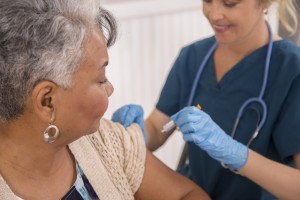 Adults are less able fight off infections as they age. Chronic diseases can weaken the immune system. It is important for seniors to receive certain vaccines to help them live healthier lives. Here are several vaccinations recommended for seniors by the Centers for Disease Control.
Adults are less able fight off infections as they age. Chronic diseases can weaken the immune system. It is important for seniors to receive certain vaccines to help them live healthier lives. Here are several vaccinations recommended for seniors by the Centers for Disease Control.
Flu vaccine (influenza)- Flu is a contagious respiratory illness that affects many people each winter. Seniors are at higher risk for developing serious complications. It’s especially important to be protected against flu if you suffer from a chronic medical condition such as COPD, diabetes, or heart disease. An annual vaccine is necessary as the virus changes each year. It takes about two weeks for the body to build up full immunity, so get vaccinated early in the season. A higher dose version is available for seniors. Medicare Part B covers the cost of the vaccine.
Pneumonia vaccine – Pneumonia is a serious lung infection that can cause significant complications for seniors, people with chronic diseases, and smokers. The vaccine is recommended for all adults age 65 and older. There are two types of pneumonia vaccines that protect against different types of pneumonia. The PCV13 vaccine is given first. A year or more later the PPSV23 vaccine can be given to protect against additional types of pneumonia. With these two shots, a senior will most likely be protected for the rest of their life. The vaccines are covered by Medicare Part B.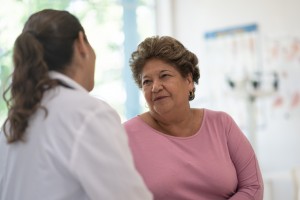
Shingles vaccine- Shingles is a painful blistering rash caused by the dormant chicken pox virus that suddenly becomes active. One in three adults gets shingles during their life. Since older adults are more likely to have serious complications, the vaccine is recommended at age 60. The older single dose version is about 51% effective for approximately five years. The newer 2-dose vaccine is about 90% effective but has a few more side effects. The newer vaccine is not as readily available at this time. A person can still receive the newer vaccine even if they have already had the single dose version. The vaccine is partially covered by Medicare Part D drug plans.
Tdap vaccine- Tdap protects against tetanus, diphtheria, and pertussis (whooping cough). Tetanus bacteria enters the body through cuts and wounds. Diphtheria and pertussis are contagious diseases spread through coughing and sneezing. Adults who have never had a Tdap vaccination should receive one, especially if they are grandparents who have contact with infants too young to be vaccinated. The Tdap vaccine is partially covered under Medicare Part D.
Speak with your health care professional at RMD Primary Care to find which of these vaccines is right for you.

Now Accepting Patients with Kaiser Permanente
At RMD Primary Care, our doctors have been hand-picked to partner with Kaiser Permanente® Georgia to serve patients under the Kaiser Permanente® Health Insurance Plans.
Our Lawrenceville family practice provides medical care to children and adults. Located near Gwinnett Medical Center – Lawrenceville, RMD Primary Care’s Gwinnett doctors are American Board Certified in Family Medicine and Internal Medicine.
Call Today: 678-430-3627
Walk-ins are welcome; appointments are recommended.

RMD Primary Care offers a full range of high-quality medical services, all on-site in our state-of-the-art facility. We offer doctors and staff who speak English, Spanish, and Hindi fluently.
Coordinating Your Care
Being part of Kaiser Permanente®, we are connected to one of the largest and most advanced electronic medical systems in the world. That means your doctors and specialists are on the same real-time page when it comes to your healthcare. You can always count on your Kaiser team to communicate with each other and with you.
The services and treatments at our Lawrenceville medical practice include:
- Physician exams
- Lab services
- Allergy testing
- Flu Shots
Insurance Coverage:
RMD Primary Care accepts commercial insurance including Kaiser Permanente and Medicare. Cash pricing is also available. Call for details.

Now Accepting Patients with Ambetter Health Insurance Plans
At RMD Primary Care, we are proud to now accept Ambetter Health Insurance.
Our Gwinnett family practice provides medical care to children and adults. Located near Gwinnett Medical Center – Lawrenceville, RMD Primary Care’s Lawrenceville doctors are American Board Certified in Family Medicine and Internal Medicine.
Call Today: 678-430-3627
Walk-ins are welcome; appointments are recommended.

RMD Primary Care offers a full range of high-quality medical services, all on-site in our state-of-the-art facility. We offer doctors and staff who speak English, Spanish, and Hindi fluently.
Coordinating Your Care
RMD Primary Care offers a full range of high-quality medical services, all on-site in our state-of-the-art facility. We offer doctors and staff who speak English, Spanish, and Hindi fluently.
Take charge of your health today.
Ambetter makes it easy for you to play an active role in reaching your best health. Proactively managing your health, and schedule route doctor visits with one of our Board-Certified Physicians.
The services and treatments at our Lawrenceville medical practice include:
- Physician exams
- Lab services
- Allergy testing
- Medical Weight Loss
- Flu Shots
Insurance Coverage:
RMD Primary Care accepts commercial insurance including Ambetter Health Insurance Plans. Cash pricing is also available. Call for details.
Skin cancer is the most common type of cancer in the U.S. Recent studies show that the number of skin cancer cases is growing each year. According to the Centers for Disease Control and Prevention (CDC), nearly 5 million people are treated each year for skin cancer. Melanoma, the deadliest type of skin cancer, causes 9,000 deaths per year in the U.S.
Click here to read more »
 What is meningitis?
What is meningitis?














